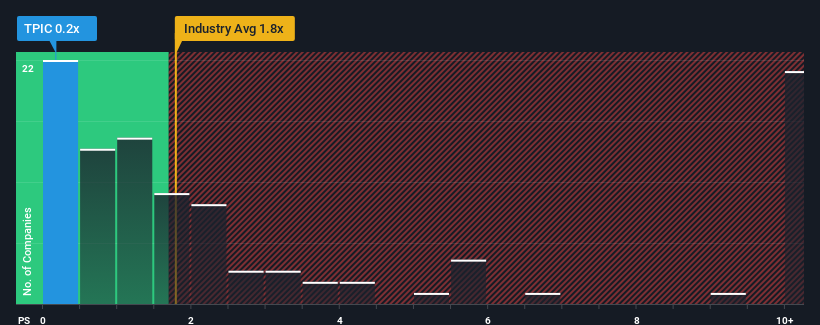- United States
- /
- Electrical
- /
- NasdaqGM:TPIC
TPI Composites, Inc. (NASDAQ:TPIC) Soars 25% But It's A Story Of Risk Vs Reward

The TPI Composites, Inc. (NASDAQ:TPIC) share price has done very well over the last month, posting an excellent gain of 25%. The last 30 days bring the annual gain to a very sharp 56%.
Although its price has surged higher, TPI Composites may still be sending buy signals at present with its price-to-sales (or "P/S") ratio of 0.2x, considering almost half of all companies in the Electrical industry in the United States have P/S ratios greater than 1.8x and even P/S higher than 6x aren't out of the ordinary. Although, it's not wise to just take the P/S at face value as there may be an explanation why it's limited.
Check out our latest analysis for TPI Composites

What Does TPI Composites' P/S Mean For Shareholders?
TPI Composites hasn't been tracking well recently as its declining revenue compares poorly to other companies, which have seen some growth in their revenues on average. The P/S ratio is probably low because investors think this poor revenue performance isn't going to get any better. If this is the case, then existing shareholders will probably struggle to get excited about the future direction of the share price.
Keen to find out how analysts think TPI Composites' future stacks up against the industry? In that case, our free report is a great place to start.How Is TPI Composites' Revenue Growth Trending?
The only time you'd be truly comfortable seeing a P/S as low as TPI Composites' is when the company's growth is on track to lag the industry.
Taking a look back first, the company's revenue growth last year wasn't something to get excited about as it posted a disappointing decline of 17%. The last three years don't look nice either as the company has shrunk revenue by 28% in aggregate. So unfortunately, we have to acknowledge that the company has not done a great job of growing revenue over that time.
Looking ahead now, revenue is anticipated to climb by 16% during the coming year according to the twelve analysts following the company. With the industry only predicted to deliver 12%, the company is positioned for a stronger revenue result.
With this information, we find it odd that TPI Composites is trading at a P/S lower than the industry. It looks like most investors are not convinced at all that the company can achieve future growth expectations.
The Bottom Line On TPI Composites' P/S
Despite TPI Composites' share price climbing recently, its P/S still lags most other companies. It's argued the price-to-sales ratio is an inferior measure of value within certain industries, but it can be a powerful business sentiment indicator.
To us, it seems TPI Composites currently trades on a significantly depressed P/S given its forecasted revenue growth is higher than the rest of its industry. When we see strong growth forecasts like this, we can only assume potential risks are what might be placing significant pressure on the P/S ratio. While the possibility of the share price plunging seems unlikely due to the high growth forecasted for the company, the market does appear to have some hesitation.
Plus, you should also learn about these 5 warning signs we've spotted with TPI Composites (including 1 which is significant).
If strong companies turning a profit tickle your fancy, then you'll want to check out this free list of interesting companies that trade on a low P/E (but have proven they can grow earnings).
Valuation is complex, but we're here to simplify it.
Discover if TPI Composites might be undervalued or overvalued with our detailed analysis, featuring fair value estimates, potential risks, dividends, insider trades, and its financial condition.
Access Free AnalysisHave feedback on this article? Concerned about the content? Get in touch with us directly. Alternatively, email editorial-team (at) simplywallst.com.
This article by Simply Wall St is general in nature. We provide commentary based on historical data and analyst forecasts only using an unbiased methodology and our articles are not intended to be financial advice. It does not constitute a recommendation to buy or sell any stock, and does not take account of your objectives, or your financial situation. We aim to bring you long-term focused analysis driven by fundamental data. Note that our analysis may not factor in the latest price-sensitive company announcements or qualitative material. Simply Wall St has no position in any stocks mentioned.
About NasdaqGM:TPIC
TPI Composites
Manufactures and sells composite wind blades, and related precision molding and assembly systems to original equipment manufacturers (OEMs) in the United States, Mexico, Europe, the Middle East, Africa, and India.
Undervalued with moderate growth potential.
Market Insights
Community Narratives



